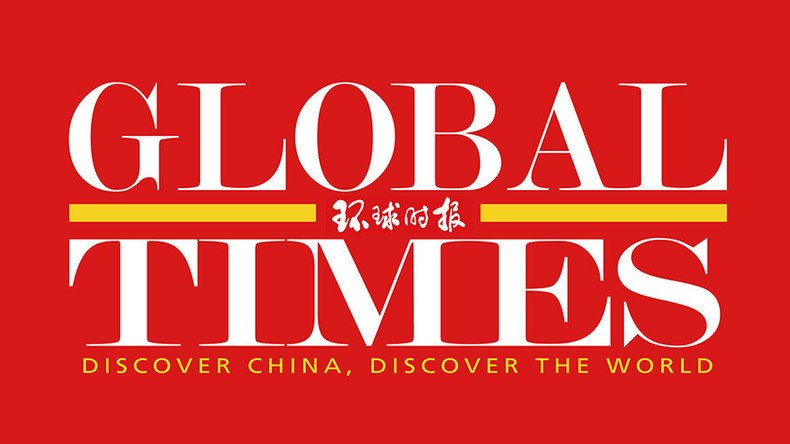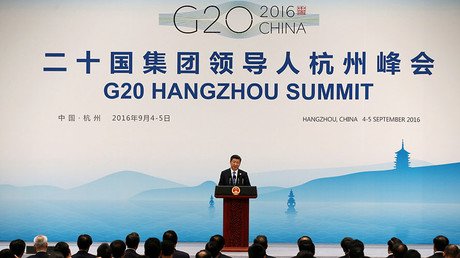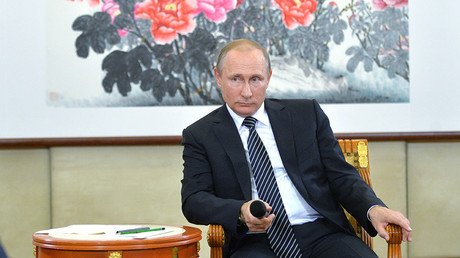G20 Summit stakes out common ground between China, Russia and the US

The G20 summit kicked off in the Chinese city of Hangzhou on Sunday. The meeting has, since the 2008 economic crisis, replaced the G7 and G8 as the most significant platform for global economic governance and the most authoritative economic forum.
Amid the global economic downturn, the G20 meeting has attracted a great deal of attention from the international community.
Top leaders from China, Russia and the US all gathered in Hangzhou for the meeting. The trilateral relationship among the three nations has long been a topic of global attention. As China, the US and Russia are not only official members of the G20, but also representatives of certain kinds of economies, the future orientation of their trilateral relationship can be speculated on from the G20.
All three nations are permanent members of the UN Security Council and also nuclear powers. The top leaders from the three countries will explore global political and economic issues with other G20 leaders.
In recent years, Russia and the US have seen tense conflicts on the issues of Ukraine, Syria and Turkey, and are economically and militarily confrontational.
Although their relationship has eased recently, their structural conflicts cannot be fundamentally solved. Meanwhile, Washington’s strategy of pivoting to the Asia-Pacific region means China and the US are confronting each other on the issues of the East China Sea, the South China Sea and the deployment of the Terminal High Altitude Area Defense (THAAD) anti-missile defense system in South Korea. Beijing and Washington, on the other hand, have seen frequent economic and cultural exchanges, and the former is a major creditor nation to the latter.
China and Russia have been getting closer to each other in recent years with the cooperation between the Belt and Road initiative and the Eurasian Economic Union, enhanced joint military drills, mutual security support, frequent top-level exchanges, and a high degree of mutual political trust.
The bilateral strategic partnership of coordination between the two countries is not a hegemonic one built on the basis of geopolitics, nor a temporary one for mutual exploitation. Their partnership is more solid than an alliance. However, more efforts should be devoted to promoting cooperation on national-level projects, deepening cultural communications and facilitating people-to-people exchanges between China and Russia.
The US is still the only superpower in comprehensive strength and economy. Although its policies were a cause of the 2008 financial crisis, the US was the quickest to recover from the crisis and has the best economic performances among the Western developed countries, and thus feels good about itself.
US economic ties with Russia are much weaker than those it has with China, and thus they mainly compete over security and politics.
After economic sanctions, Russia intends to improve its economic ties with Western countries. However, Moscow’s economic difficulties have been exaggerated, considering its cooperation with China and its abundant resources. Russia’s presence at the border with Ukraine is a military and political show, which demonstrates its firm stance to the US.
The US containment of China in the Asia-Pacific region is a short-sighted strategic mistake, and the White House should adapt to China’s peaceful rise.
Some Americans believe that China’s economy has far exceeded that of Russia, and thus China’s military power will become the largest security threat to the US sooner or later. This is groundless, as China has no intention to challenge the international status of the US. China is a “reformer,” rather than a “revolutionary,” of the international order.
The US is unwise and incapable to squeeze the strategic space of China and Russia, which rival Washington in many aspects. The US is over-confident to combat a doomed-to-fail two-front battle, and its hegemonic tendencies push China and Russia closer.
Cold War mentality and power politics are no longer applicable in the new era. This year’s G20 summit is themed “Toward an Innovative, Invigorated, Interconnected and Inclusive World Economy.”
As a host country, China shoulders significant responsibilities for this year’s summit. China should continue to play its role as a locomotive of the world economy, put forward effective solutions, act with vision and make Chinese voices heard in the world arena.
In addition, China and the US should avoid strategic miscalculations and put security disputes under control, as neither can afford a real war. The two sides should seek common ground and reserve differences in politics, and play the role as ballast for the smooth development in the world economy.
China should also mediate the relationship between Russia and the US, between developed and developing economies, and oppose to trade protectionism. Economic sanctions are internecine and will deteriorate the international economic and political atmosphere.
All parties should take advantage of the G20 platform to negotiate for consensus. After all, negotiations are much more helpful than silence.
Li Xing is director of the Eurasian Studies Center and a professor at the School of Government, Beijing Normal University.
This article was first published at Global Times China.
The statements, views and opinions expressed in this column are solely those of the author and do not necessarily represent those of RT.














